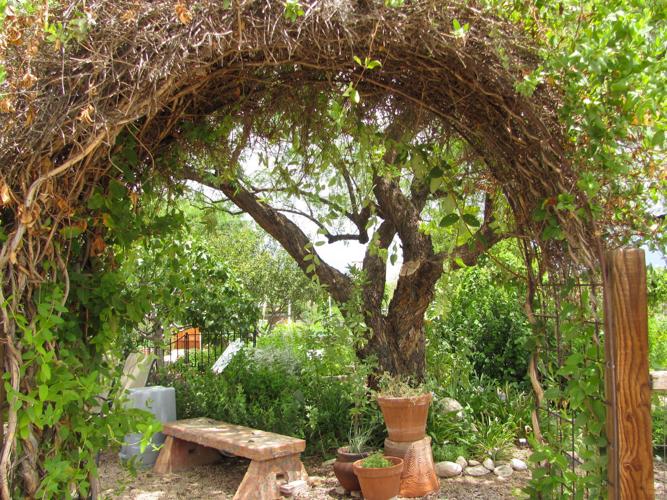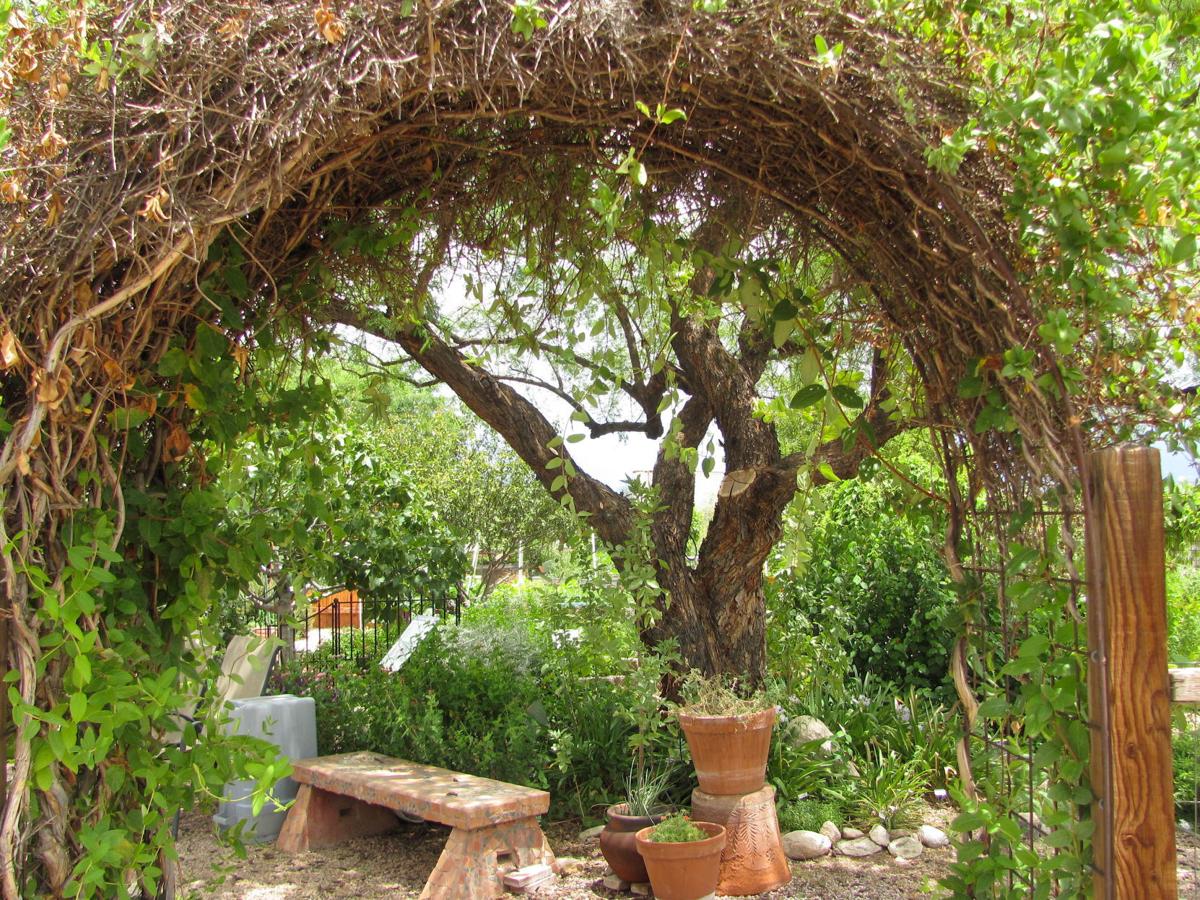As part of the 23rd annual Master Gardener Home Garden Tour on April 6, the Pima County Master Gardeners have organized special exhibits at their demonstration gardens.
The three special exhibits are on topics that many gardeners will find useful. The Arizona-Sonora Desert Museum, the Southern Arizona Beekeepers Association and the Tucson Audubon Society will feature lots of fun information about how to become a desert tortoise custodian, honeybees in the garden and how to establish pollinator and bird-friendly gardens.
The exhibits are in addition to the five Master Gardener home garden tours which are taking place the same day.
The demonstration gardens are located at 4210 N. Campbell Ave. and the special exhibits will take place from 9 a.m. to 3 p.m.
Arizona-Sonora Desert Museum exhibit
This exhibit will be a boon for anyone who wants to know more about our desert reptiles. There will be a variety of venomous guests and also some baby desert tortoises — always a big hit with the public.
Rachel Bramel, desert tortoise adoption coordinator at the Arizona-Sonora Desert Museum, says the exhibit will feature information for people who are interested in becoming custodians of a desert tortoise. It’s also a great opportunity for people to interact with and learn about the tortoises in a setting that’s safe for the reptiles.
Bramel has done other outreach activities like this one, and says it’s a great time for kids and adults. It’s also useful information for gardeners who want to provide food for desert tortoises in their backyard.
“We get to talk to people about plants the tortoises will prefer and kind of help shape their garden as they're building it," she says. Luckily since they are native tortoises, just about anything you have, they love — particularly flowers.”

The Arizona-Sonora Desert Museum exhibit will have baby tortoises like this one for visitors to interact with at the Pima County demonstration gardens.
There are more than 100 desert tortoises that need homes. These are animals that were illegally bred in captivity, or have a health issue that prevents them from being released. Arizona Game and Fish cares for them and adopts them out to other organizations like the Desert Museum. Private individuals can adopt a tortoise if they meet the criteria and build a habitat (including a hibernation burrow) in their yard.
Bramel has gotten to know over 300 desert tortoises over the years, and says that they are charming animals with their own personalities.
“I’ve never known two that were exactly the same,” Bramel says. "Every single one is an individual.” The museum uses candidate application information to try to match up a tortoise with the perfect home that suits his or her personality.
Bramel says desert tortoises can be excellent, low-maintenance pets. “They are such, such easy pets to have, especially if you already are maintaining a garden because that's all the food they need. And then, because they're so well desert adapted, they don't need a ton of water … They're really awesome pets. They can be really social… they learn to recognize voices and are really excited to hang out with their caretakers.”
The tortoises are still technically property of Arizona Game and Fish, so they cannot be taken out of state if the custodian moves. If there are issues with the tortoise and other pets, particularly dogs, Bramel says there is no problem with the museum taking back the tortoise. “If life circumstances change or anything like that, they're always welcome back into the program.”
Southern Arizona Beekeepers Association exhibit
The Southern Arizona Beekeepers Association will also be on hand if you want to learn more about these fascinating little creatures.
SAZBA provides education and support to beekeepers, educates the public about beekeeping and supports research into apiculture. SAZBA also has information on their website about businesses that remove and relocate unwanted wild honeybee swarms and colonies.
Will Fitz, president of the Southern Arizona Beekeepers Association, says there will be a number of fun exhibits for visitors, including an observation hive with a glass panel to watch bees at work, a plant list for gardeners who want to support pollinators, and information on beekeeping in Arizona.
There will also be information about providing water safely for bees and other pollinators. “Bees use water to cool their colonies and they consume it, as well,” says Fitz. Visitors will learn how to create a safe water source for honeybees and attract more bees to your garden.
In addition, Fitz says there will be information on wild Africanized honeybees and how homeowners can avoid having them set up camp in their backyard. Wild honeybees love sheltered spaces with small entrances, so they can colonize irrigation valve boxes, eaves and unsealed attics, concrete block walls that haven’t been sealed up, and similar spaces. They also love to live under shed floors.
“We'll talk about where to look for and what to do to try and avoid bees (moving) onto your property,” says Fitz.
Some SAZBA members provide bee removal services for a small fee, which is a humane way of relocating the bees without exterminating them. The bees are initially put into a colony box with their original queen, and then, at a future date, the queen is replaced by a more docile European-stock queen. Over a period of about seven weeks the original, more aggressive worker bees die off naturally and are replaced by the new, tamer bees.
Even within wild, Africanized bee hives, Fitz says there is a spectrum of aggressiveness. ”They're not all very, very vicious, but it's better to assume that they're aggressive and treat them with caution … Don't try and DIY your way through an Africanized bee colony. It's something that really can turn on you pretty quickly. It's best to leave it to somebody who's got experience and all the right protective equipment.”
Tucson Audubon Society exhibit
The Tucson Audubon Society will be sharing information on pollinator gardens, including tips on how to design and build them. Kimberly Matsushino, Habitat at Home program manager at Tucson Audubon, says that homeowners who need some help with pollinator gardens can get the full range of services, including installation, from Tucson Audubon.
There will also be information on attracting specific bird species, nest boxes, tortoise habitats, plant lists, seed packets and other helpful items. The piece de resistance, according to Matsushino, will be Tucson Audubon’s new mobile native plant trailer. This is a food-truck type vehicle which gives out native plants in underserved urban communities that are particularly vulnerable to heat. Tucson Audubon hired local artist Pen Macias to design a mural for the truck.
“It's this beautiful 17-foot cargo trailer. We retrofitted it so that it will just be able to load a bunch of plants and then run off solar power … (it’s) been a big, big hit with everybody that's seen it,” says Matsushino.
Tucson Audubon also offers buffelgrass removal and restoration services for homeowners who want to return their yards to a more natural, native state.
A tortoise at an eastside home was grateful for cool water during this heat wave. After drinking, the tortoise eventually dipped more of its head and a foot into the water. Video by Nick Murray.






